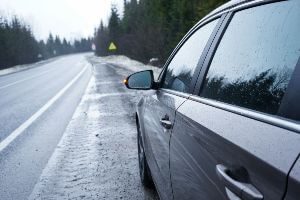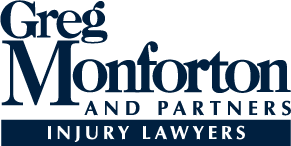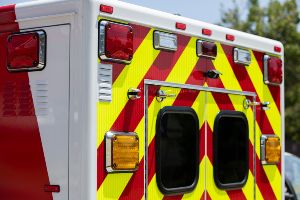 Many people assume that when a crash involves a vehicle stopped on the side of the road, the driver of the passing car is at fault. For example, people may assume the driver of the passing vehicle was speeding or not paying attention.
Many people assume that when a crash involves a vehicle stopped on the side of the road, the driver of the passing car is at fault. For example, people may assume the driver of the passing vehicle was speeding or not paying attention.
While passing drivers are often the ones at fault, there may be times when the driver of the stopped vehicle is partially at fault. The car on the roadside may have been blocking traffic or the driver may not have flipped on the vehicle’s hazard lights.
Another factor to consider in these accidents is Ontario’s Move Over law, which requires drivers to move over when an emergency vehicle is on the side of the road and its lights are flashing.
If you were injured in a roadside crash and you think the other driver is at fault, a Windsor auto accident lawyer from Greg Monforton and Partners may be able to help you seek compensation. Our legal services come with no upfront costs or obligations.
We are ready to take your call: (866) 320-4770.
Why Drivers Stop on the Side of the Road
Drivers should do their best to avoid stopping on the side of the road. If possible, pull into a parking lot or somewhere else that is a safe distance from the flow of traffic.
You should not count on other drivers to use caution when passing your vehicle on the side of the road. Drivers are often not paying as much attention as they should. They may also be speeding.
Taking appropriate steps to maintain your vehicle can help you avoid the need for emergency stops on the side of the road. For example, if you are low on gas, fill up before your drive. You never know when you might get stuck in traffic and run through the rest of the gas in the tank.
If a warning light comes on, take your vehicle to a qualified mechanic to have the issue investigated. Make sure your tires are properly inflated to help prevent a blowout or flat. If the tire pressure monitoring light comes on, add air so you are not driving around on underinflated tires.
However, there are times when stopping on the roadside is unavoidable, such as if your car:
Runs Out of Gas
If you are on a long drive, you could run out of gas before you can reach a gas station. You may have thought you could reach the next rest area before you would run out.
Gets a Flat Tire
You could run over a nail or other sharp object without realizing it and one of your tires could go flat. You may be a long way from another intersection or exit to the highway so you may be forced to stop on the side of the road.
Has an Overheated Engine
If your car’s temperature gauge seems high, you should get off the road as soon as possible and investigate what is happening. However, sometimes drivers do not notice a high temperature gauge until smoke is coming out from under the hood and they are forced to pull over.
Types of Roadsides
There are different types of roadsides. For example, a soft shoulder is one with gravel instead of asphalt. Hard shoulders are made of asphalt, like the rest of the road. There may also be shoulders where you are allowed to drive.
Ontario’s Move Over Law
When drivers pull onto the roadside, they often call for roadside assistance because they cannot drive their vehicle. Drivers may call a tow truck or even 9-1-1 if they are on the side of the road because they crashed. For example, a driver may have lost control and hit a road sign or guardrail.
When emergency vehicles like ambulances, police cars, fire rescue vehicles and tow trucks stop on the roadside they are there to help. That is why a law was passed to help protect these vehicles and their occupants when they help drivers stopped on the shoulder of the road.
Ontario’s Move Over law is contained in the Highway Traffic Act. Under this law, passing drivers have certain obligations to emergency vehicles with flashing lights. First, drivers need to move over if the road has two or more lanes. If moving over is not possible, drivers need to slow down to a speed below the posted limit and use caution while passing. If a driver cannot move over because he or she is speeding, this could be considered a violation of the law.
Drivers who are convicted of violating the Move Over law could be fined between $400 and $2,000. They may also receive three demerit points. Another offense within five years of the first could result in a fine of $1,000 to $4,000. You could also face a jail sentence of up to six months and your licence could potentially be suspended for as much as two years.
Ontario’s Move Over law also applies to public utility vehicles. They may be stopped to fix some problem with the road, a utility pole, or some other issue.
Who Could be at Fault for a Roadside Crash?
There is no one answer to the question of liability for such a crash. Each roadside crash needs to be evaluated on a case-by-case basis.
Driver of the Stopped Vehicle
It may be possible for the driver of the vehicle on the roadside to be held liable. Maybe the driver did not pull over far enough and it was too difficult for passing cars to avoid a collision. If it was nighttime and the driver did not turn on his or her hazard lights, his or her vehicle may have been hard to see.
Another factor to consider is whether the driver could have pulled over in a safer location. Was it necessary for the driver to pull over on the roadside? Could he or she have made it somewhere else?
Driver of the Passing Car
Often, the driver of the passing vehicle is held liable for a collision with a car on the roadside. The driver of the passing vehicle may have been driving recklessly (speeding, driving without headlights on, distracted driving, etc.).
If there was an emergency vehicle on the roadside as well, the passing driver may be liable for violating Ontario’s Move Over law.
Government Entities
It may be possible for the party responsible for maintaining the road to bear partial fault for a collision on the shoulder. For example, a passing car may have hit a pothole and the driver may have lost control. The party responsible for the road may have had an obligation to fix the pothole.
Greg Monforton and Partners is Here to Help. Call Today
If you are unsure if you may be eligible to seek compensation for your crash damages, contact Greg Monforton and Partners. An initial legal consultation is 100 per cent free of charge. There are also no upfront fees if we take your case.
Experienced Lawyers. Proven Results.
Call us at (866) 320-4770.




